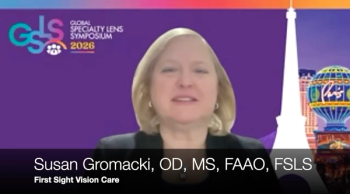
Bevacizumab injections effective in treating macular neovascularization in myopic patients
Researchers retrospectively analyzed the longitudinal clinical data of 117 eyes of 106 Caucasian patients with high myopia MNV treated with intravitreal bevacizumab injections.
Monica Ravenstijn, MD, from the Rotterdam Ophthalmic Institute, Rotterdam Eye Hospital, and the Departments of Epidemiology and Ophthalmology, Erasmus Medical Center, both in Rotterdam, The Netherlands, and colleagues reported that visual improvements that resulted from intravitreal injections of bevacizumab (Avastin, Genentech) administered to treat macular neovascularization (MNV) in myopic patients did not persist and the MNV recurred.1
The researchers retrospectively analyzed the longitudinal clinical data of 117 eyes of 106 Caucasian patients with high myopia MNV treated with intravitreal bevacizumab injections. The patients were followed from the initiation of treatment for up to 12 years. The primary outcome measures were the best-corrected visual acuity (BCVA) changes and the recurrence of myopic MNV.
Long-term outcomes
Ravenstijn reported that the BCVA was a mean of 0.56 ± 0.46 logarithm of the minimal angle of resolution (logMAR)(20/80 Snellen) that improved significantly with the first injection to 0.33 ± 0.33 (20/50 Snellen), a difference that reached significance (P < 0.001).
By 4 years after the first injection, in 86 eyes, the BCVA was 0.55 ± 0.57 (P = 0.30) and was not significantly better than the baseline value. The BCVA decreased to 0.84 ± 0.76 (20/125 Snellen) at the 10-year time point in 27 eyes; MNV-related chorioretinal atrophy developed in 53% of those who completed the 10-year visit.
The cumulative incidence rates of recurrent myopic MNV were 34% at 2 years and 59% at 5 years. The decreases in the BCVA eyes with and without recurrent MNV were similar (P =0.58), according to the investigators.
They also found that patchy chorioretinal atrophy and subfoveal MNVs were associated significantly (P = 0.02 and P=0.048, respectively) with recurrent MNV.
The researchers concluded that the positive treatment effect of anti-vascular endothelial growth factor injections lasted for 5 years in this patient population.
“Lifelong treatment is not necessary for most myopic MNV in that 1 to 10 injections were enough to cause regression of the MNV in 91% of cases. One of two eyes developed a recurrent myopic MNV over time, but recurrences did not worsen the course of the BCVA. Large prospective studies using multimodal imaging are needed to build on these findings and elude biomarkers to optimize treatment and visual outcome,” they concluded.
Reference
1. Ravenstijn M, Klaver CCW, Yzer S. et al. Long-term treatment outcomes after bevacizumab therapy for macular neovascularization in white patients with high myopia. Retina. 2021; 43:444-53; DOI: 10.1097/IAE.0000000000003675Metrics
Newsletter
Want more insights like this? Subscribe to Optometry Times and get clinical pearls and practice tips delivered straight to your inbox.















































